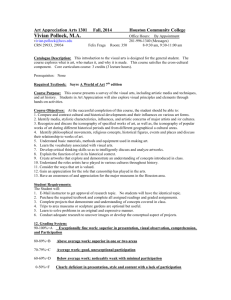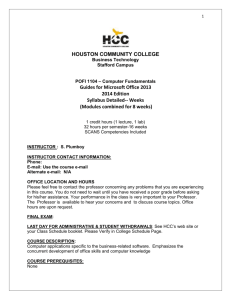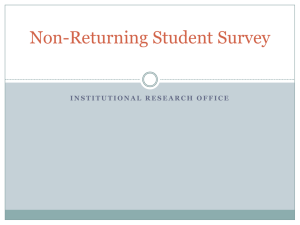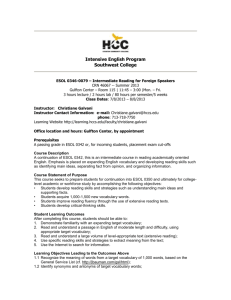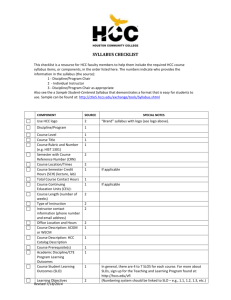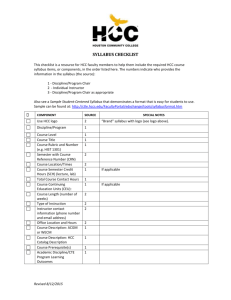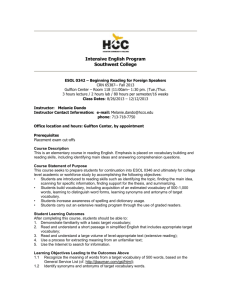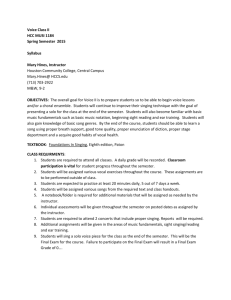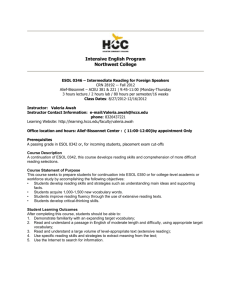LEAD1200_74826_Syllabus_F8A
advertisement
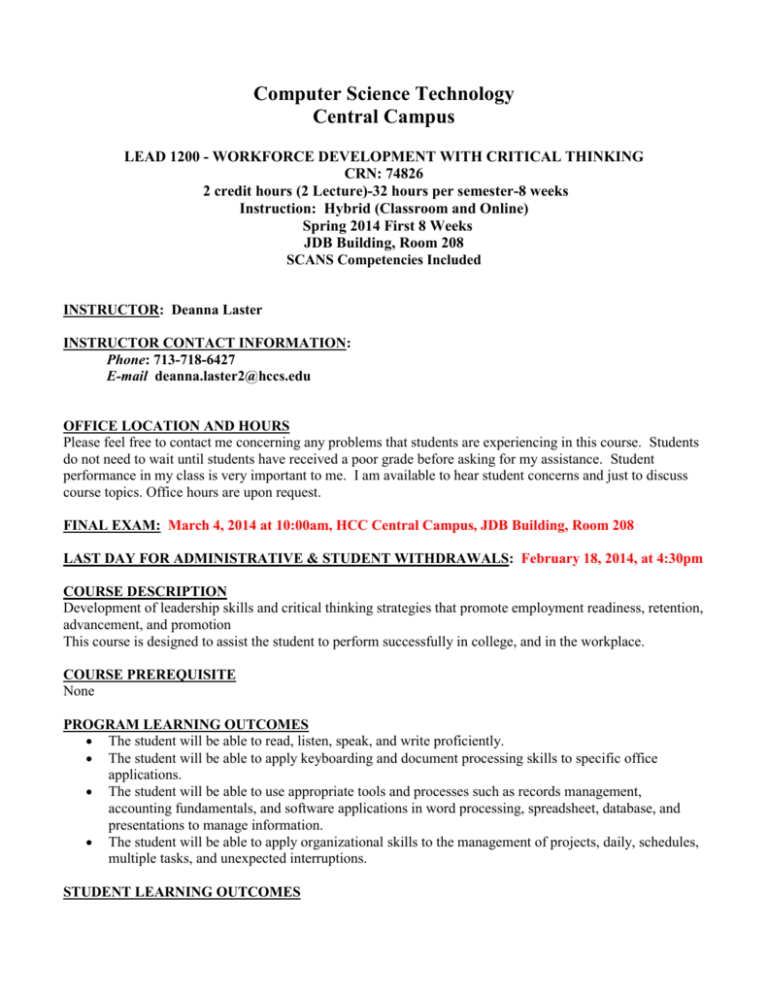
Computer Science Technology Central Campus LEAD 1200 - WORKFORCE DEVELOPMENT WITH CRITICAL THINKING CRN: 74826 2 credit hours (2 Lecture)-32 hours per semester-8 weeks Instruction: Hybrid (Classroom and Online) Spring 2014 First 8 Weeks JDB Building, Room 208 SCANS Competencies Included INSTRUCTOR: Deanna Laster INSTRUCTOR CONTACT INFORMATION: Phone: 713-718-6427 E-mail deanna.laster2@hccs.edu OFFICE LOCATION AND HOURS Please feel free to contact me concerning any problems that students are experiencing in this course. Students do not need to wait until students have received a poor grade before asking for my assistance. Student performance in my class is very important to me. I am available to hear student concerns and just to discuss course topics. Office hours are upon request. FINAL EXAM: March 4, 2014 at 10:00am, HCC Central Campus, JDB Building, Room 208 LAST DAY FOR ADMINISTRATIVE & STUDENT WITHDRAWALS: February 18, 2014, at 4:30pm COURSE DESCRIPTION Development of leadership skills and critical thinking strategies that promote employment readiness, retention, advancement, and promotion This course is designed to assist the student to perform successfully in college, and in the workplace. COURSE PREREQUISITE None PROGRAM LEARNING OUTCOMES The student will be able to read, listen, speak, and write proficiently. The student will be able to apply keyboarding and document processing skills to specific office applications. The student will be able to use appropriate tools and processes such as records management, accounting fundamentals, and software applications in word processing, spreadsheet, database, and presentations to manage information. The student will be able to apply organizational skills to the management of projects, daily, schedules, multiple tasks, and unexpected interruptions. STUDENT LEARNING OUTCOMES 1. Identify characteristics of employees who are qualified for employment and worthy of promotion and retention in the workforce 2. Explain critical thinking strategies within the context of strong leadership 3. Apply effective business communication skills; utilize data and information to make effective decisions 4. Identify roles and strategies used in group processes and team building. LEARNING OBJECTIVES 1.1 Be able to recognize time management and prioritization techniques for effective study and test taking 1.2 Be able to describe roles, tasks, employment opportunities, and outlook for various workforce careers 2.1 Demonstrate effective reading, listening and note-taking strategies 2.2 Identify effective communications techniques 2.3 Recognize sound practices to perform well 3.1 Be able to match personal interests and abilities with careers and majors 3.2 Be able to write a résumé 3.3 Identify school policies, Student Services department, and college procedures 4.1 Describe effective job search and interviewing techniques SCANS The Secretary’s Commission on Achieving Necessary Skills (SCANS) from the U.S. Department of Labor was asked to examine the demands of the workplace and whether our young people are capable of meeting those demands. Specifically, the Commission was directed to advise the Secretary on the level of skills required to enter employment. In carrying out this charge, the Commission was asked to do the following: Define the skills needed for employment, Propose acceptable levels of proficiency, Suggest effective ways to assess proficiency, and Develop a dissemination strategy for the nation’s schools, businesses, and homes. SCANS research verifies that what we call workplace know-how defines effective job performance today. This know-how has two elements: competencies and a foundation. This report identifies five competencies and a three-part foundation of skills and personal qualities that lie at the heart of job performance. These eight requirements are essential preparation for all students, whether they go directly to work or plan further education. Thus, the competencies and the foundation should be taught and understood in an integrated fashion that reflects the workplace contexts in which they are applied. The five SCANS workplace competencies identified by the Commission are the following: 1. Resources—An ability to identify, organize, and allocate time, money, materials, space, and people. Much of what you do in the classroom can help students develop competency with resources. Emphasize planning skills in relation to preparing, working, and completing assignments. 2. Interpersonal—Skills to participate as a member of a team, teach others, serve customers, exercise leadership, negotiate, and work with others possessing diverse backgrounds. Cooperative/collaborative learning activities are an effective way to teach interpersonal skills. In discussions after group activities, emphasize interpersonal lessons and challenges of the activities. 3. Information—An ability to acquire, organize, evaluate, interpret, and communicate information along with using computers to process information. Competency with information is basic to any classroom. Emphasize those efforts to master information skills prepare students for future employment. 4. Systems—An understanding of social, organizational, and technological systems; an ability to monitor and correct performance; a competence in the design and improvement of systems. Look for opportunities for students to use critical thinking skills to identify and analyze systems in their school, community, nation, and world. 5. Technology—The knowledge and skill to select equipment and tools, apply technology to specific tasks, and maintain and troubleshoot software and hardware. Although there are many forms of technology that can be used in your class, computers create real interest and opportunities for your students. Encourage your students to make computers an important part of their education, whether the computers are used in self-paced learning or in group projects. The following skills will be developed in the Workforce Development with Critical Thinking course: Using Resources: Identify—Plan—Manage Developing Interpersonal Skills: Collaborate—Negotiate—Lead Applying Technology: Select—Apply—Enhance Understanding Systems: Connect—Support—Improve Acquiring Information: Evaluate—Communicate—Apply The three SCANS foundation skills identified by the Commission are the following: Basic Skills—Reading, writing, mathematics, listening, and speaking. classroom activities can develop and reinforce all these basic skills. Teaching these skills in the classroom can provide cross-curricular opportunities. Thinking Skills—Creative thinking, decision-making, and problem solving, seeing things in the mind’s eye, knowing how to learn, and reasoning. During their careers, students will need this foundation to adapt to a rapidly changing society. Helping students to think critically becomes very important so that they may adjust to change. Seek opportunities for students to stretch their minds, find new answers, ask hard questions, and lay foundations for lifelong learning. Personal Qualities—Responsibility, self-esteem, sociability, self-management, and integrity. Throughout their lives, your students will need to get along with others: with classmates, friends and family, customers, and coworkers. Look for chances to reinforce good personal qualities. And remember the power of teaching by example. EIGHT WEEK TERM COURSE CALENDAR WEEKLY SCHEDULE OF ASSIGNMENTS WEEK ONE: Orientation Biography Before you Begin Assessment The Power of Self-Belief Assignment: Learning and Study Strategies Inventory (LASSI) http://www.hccs.edu/continuing-education/students/advising/first-year-advising-program/ WEEK TWO Managing Money Preparing for Your Career Assignment: TypeFocus Survey http://careers.typefocus.com WEEK THREE Setting Goals and Managing Time Improving Your Thinking Skills Quiz One Assignment: Library Orientation http://library.hccs.edu/?q=Begin_research WEEK FOUR Improving Your Study Skills Eating Well Class Visit: HCC Advisor WEEK FIVE Staying Healthy Communicating Effectively Quiz Two Assignment: Career Exploration http://www.kuder.com WEEK SIX Improving Your Listening Skills Improving Your Speaking Skills Assignment: Vision Board Presentations WEEK SEVEN Getting Along with Others Functioning in Groups Assignment: Vision Board Presentations WEEK EIGHT Handling Change and Stress Final Examination INSTRUCTIONAL METHODS LEAD 1200 is a required course for Business Technology certificates and AAS degrees. This course instruction will be delivered via the Internet. As an instructor, I want my students to be successful. I feel that it is my responsibility to provide students with knowledge concerning workforce development with critical thinking, modeling good teaching strategies, and organizing and monitoring the field experience that allows students to connect the information that students learn in this course to the real world of education. As a student wanting to learn about workforce critical thinking, it is student’s responsibility to read the textbook, submit assignments on the due dates, study for the exams, participate in activities, and attend class. STUDENT ASSIGNMENTS Assignments have been developed that will enhance student learning. To better understand a topic, students will be given assignments on key information that students will need to remember for student success in student reaching student goals. PRINT A COPY OF YOUR SYLLABUS LATE ASSIGNMENTS Students are expected to adhere to the weekly schedule of assignments printed in the course syllabus. Late assignments will not be accepted. Instructions for submitting assignments: 1. All assignments must be submitted under the proper assignment for credit. Only the assigned assignment will be graded under the proper assignment. 2. An inserted header is required on each assignment. Include your name and name of the assignment in the header. Points will be deducted for assignments submitted without a header that includes your name and title of assignment. 3. Assignments are available weeks in advance. Therefore, late assignments will not be accepted. 4. Please communicate with me through the class email. 5. Class e-mail is checked on a regular basis and responded to within a 48 hour period, Monday through Friday. 6. You are not responsible for assignments and tests that unavailable due to maintenance downtime in Eagle Online will be down for service. I will be aware when this happens. 7. Discussion Question forums (DQs) must be responded to by deadline date for credit. Be sure to read the instructions regarding the grading of Forums (discussion items). The forum responses will not be graded if posted after the due date. Do not attach files to your Forum postings. MAKE-UP TEST POLICY Students are expected to adhere to the weekly schedule of assignments printed in the course syllabus. Late assignments will not be accepted. There are no make-up tests administered. NOTE TO THE STUDENT If you have any questions or concerns about the course and/or course assignments, please contact me via course email (email’s) so that we can resolve any issues. I will respond to your email within a 24-36 hour period. If you are experiencing difficulties with the course material and unable to email me, leave a detailed message at my office telephone number, 713.718.7413. I will respond to telephone calls within a 48 hour period. If your concerns are not resolved, you are encouraged to contact my supervisor, Willie Caldwell, email: willie.caldwell@hccs.edu or 713-718-7808 or Room N109 Scarcella Building. Periodically, the server will be down for service. In the event that this occurs, don’t panic; inform me so that I am also aware that the course is not accessible due to the server being inaccessible. In the event that this occurs, your assignment will not be considered late. INSTRUCTOR REQUIREMENTS As the Instructor, it is my responsibility to: Provide the grading scale and detailed grading formula explaining how student grades are to be derived Facilitate an effective learning environment through class activities, discussions, and lectures Description of any special projects or assignments Inform students of policies such as attendance, withdrawal, tardiness and make up Provide the course outline and class calendar which will include a description of any special projects or assignments Arrange to meet with individual students as required To be successful in this class, it is the student’s responsibility to: Log in to the class and participate in class activities Read and comprehend the textbook Complete the required assignments and exams on time: Ask for help when there is a question or problem Complete the field study with a 70% passing score PROGRAM/DISCIPLINE REQUIREMENTS Business Technology is determined to prepare students with the knowledge and skills needed to succeed in today’s dynamic work environment. Students in Workforce Development with Critical Thinking must be able to budget their time and perform class-related activities as assigned on a weekly basis. Students also perform various general activities as well as workbook activities related to Workforce Development with Critical Thinking.. DEGREE PLAN Students are encouraged to file a degree plan with a Counselor or the Business Technology Department for the certificate and/or degree plan. Please ask your instructor for Degree Plan information or contact the Business Technology Department for information about filing a degree plan. VIRTUAL CAREER CENTER The Virtual Career Center assist HCC Students and Alumni with career planning, assessments, job search and soft-skills training. Orientations and registration are available at all Southwest College Campuses. http://www.hccs.edu/hccs/current-students/career-planning-and-resources/southwest-college GRADING HCCS Grading System The Houston Community College grading system will be used to evaluate students’ performance in this course. Grade A-Excellent B-Good C-Fair Score 100-90 89-80 79-70 D-Passing F-Failure 69-60 59 and below Student Evaluation The following departmental grading system will be used to evaluate students’ performances in this course: Critical Thinking Activities / Class Participation Assessments Final Exam TOTAL 40% 40% 20% 100% INSTRUCTIONAL MATERIALS REQUIRED TEXTBOOKS Bundle: Reaching Your Potential: Personal and Professional Development, 4th Edition; Robert K. Throop and Marion B. Castellucci; ISBN - 9781133298670 Students are required to purchase the textbook for this class. STUDENT INFORMATION A student handbook is available on the College website: http:/www.hccs.edu. Look under the student subheading to get detailed information concerning students attending Houston Community College System (HCCS). Data such as withdrawal policies, refund policies, incomplete, late assignments, make-ups, extra credit, grading system, attendance requirements, and other details are included in the student handbook. HCC DISTANCE EDUCATION POLICIES AND PROCEDURES This class will be taught via Eagle Online. Eagle Online is a new learning management system at HCC. Refer to :http://online.hccs.edu for resources. The Help Desk for Eagle Online is different than the one for Blackboard Vista and the link is "INSIDE" the course in the top header "HELP" and it will be on the log in page. HCC COURSE WITHDRAWAL AND ATTENDANCE POLICY HCC Course Withdrawal Policy Beginning Fall 2007, the State of Texas imposes penalties on students who drop courses excessively. Students are limited to no more than SIX total course withdrawals throughout their educational career at a Texas public college or university. To help you avoid having to drop/withdraw from any class, contact your DE professor regarding your academic performance. You may also want to contact your DE counselor to learn about helpful HCC resources (e.g. online tutoring, child care, financial aid, job placement, etc.). HCC has instituted an Early Alert process by which your professor may “alert” you and DE counselors that you might fail a class because of excessive absences and/or poor academic performance. Students should check HCC’s Academic Calendar by Term for drop/withdrawal dates and deadlines. If a student decides to drop or withdraw from a class upon careful review of other options, the student can drop online prior to the deadline through their HCC Student Service Center: https://hccsaweb.hccs.edu:8080/psp/csprd/?cmd=login&languageCd=ENG Classes of other duration (mini-term, flex-entry, 8-weeks, etc.) may have different final withdrawal deadlines. Please contact the HCC Registrar’s Office at 713.718.8500 to determine mini-term class withdrawal deadlines. Class Attendance As stated in the HCC Catalog, all students are expected to attend classes regularly. Students in DE courses must log in to their Eagle Online class or they will be counted as absent. Just like an on-campus class, your regular participation is required. Although it is the responsibility of the student to drop a course for non-attendance, the instructor also has the authority to block a student from accessing Eagle Online, and/or to drop a student for excessive absences or failure to participate regularly. DE students who do not log in to their Eagle Online class before the Official Day of Record will be AUTOMATICALLY dropped for non-attendance. Completing the DE online orientation does not count as attendance. STUDENT SERVICES The Distance Education Student Handbook contains policies and procedures unique to the DE student. It is the student's responsibility to be familiar with the handbook's contents and part of the mandatory orientation. The handbook contains valuable information, answers, and resources, such as DE contacts, policies and procedures (how to drop, attendance requirements, etc.), student services (ADA, financial aid, degree planning, etc.), course information, testing procedures, technical support, and academic calendars. Refer to the DE Student Handbook by visiting this link: http://de.hccs.edu/de/de-student-handbook EARLY ALERT HCC has instituted an Early Alert process by which your professor may “alert” you and DE counselors that you might fail a class because of excessive absences and/or poor academic performance. International Students Contact the International Student Office at 713-718-8520 if you have questions about your visa status. STUDENTS WITH DISABILITIES Any student with a documented disability (e.g. physical, learning, psychiatric, vision, hearing, etc) who needs to arrange reasonable accommodations must contact the appropriate HCC Disability Support Service (DSS) Counselor at the beginning of each semester. Instructors are authorized to provide only the HCC DSSO approved accommodations but must do so in a timely manner. Students who are requesting special testing accommodations must first contact the appropriate (most convenient) DSS office for assistance each semester: DISABILITY SUPPORT SERVICES OFFICES: System: 713.718.5165 Central: 713.718.6164 – also for Deaf and Hard of Hearing Services and Students Outside of the HCC District service areas. Northwest: 713.718.5422 Northeast: 713.718.8420 Southeast: 713.718.7218 Southwest: 713.718.7909 After student accommodation letters have been approved by the DSS office and submitted to DE Counseling for processing, students will receive an email confirmation informing them of the Instructional Support Specialist (ISS) assigned to their professor. NOTICE FOR STUDENTS OUTSIDE OF HCC SERVICE AREA: PROCTORING Students who live or work outside the HCC service area and cannot take paper exams at one of our HCC testing locations MUST make arrangements for a proctor. For more information and to complete the required Proctor Approval Form, please visit de.hccs.edu. VIRTUAL CLASSROOM CONDUCT As with on-campus classes, all students in HCC Distance Education courses are required to follow all HCC Policies & Procedures, the Student Code of Conduct, the Student Handbook, and relevant sections of the Texas Education Code when interacting and communicating in a virtual classroom with faculty and fellow students. Students who violate these policies and guidelines will be subject to disciplinary action that could include denial of access to course-related email, discussion groups, and chat rooms or being removed from the class. ONLINE TUTORING HCC provides free online tutoring in writing, math, science, and other subjects. How to access Tutoring: Click on the Tutoring button in the banner of the Eagle Online course listings page. This directs students to the HCC AskOnline Tutoring site: http://hccs.askonline.net/. Use your student ID or HCC e-mail address to create an account. Instructions, including a 5-minute video, are provided to make you familiar with the capabilities of this service. SOCIAL NETWORKING DE students are encouraged to become a fan of DE on Facebook http://www.facebook.com/HCCDistanceEd and to follow DE on Twitter: http://twitter.com/HCCDistanceEd These social networking sites help DE foster student engagement and provide a sense of community for the online learner. Students will also stay informed about important information and announcements. LIBRARY RESOURCES As a DE student you have the same access to first-rate information resources that the HCC Libraries make available to all HCC students. A special website pulls together all the tools DE students will need to get their research rolling. Visit Library Resources specifically for Distance Education students. ACADEMIC DISHONESTY You are expected to be familiar with the College's Policy on Academic Honesty, found in the catalog and student handbook. Students are responsible for conducting themselves with honor and integrity in fulfilling course requirements. Penalties and/or disciplinary proceedings may be initiated by College System officials against a student accused of scholastic dishonesty. “Scholastic dishonesty”: includes, but is not limited to, cheating on a test, plagiarism, and collusion. Cheating on a test includes: • Copying from another students’ test paper; • Using materials not authorized by the person giving the test; • Collaborating with another student during a test without authorization; • Knowingly using, buying, selling, stealing, transporting, or soliciting in whole or part the contents of a test that has not been administered; • Bribing another person to obtain a test that is to be administered. Plagiarism means the appropriation of another’s work and the unacknowledged incorporation of that work in one’s own written work offered for credit. Collusion mean the unauthorized collaboration with another person in preparing written work offered for credit. Possible punishments for academic dishonesty may include a grade of 0 or F in the particular assignment, failure in the course, and/or recommendation for probation or dismissal from the College System. (See the Student Handbook). Academic dishonesty can result in a grade of F or 0 for the particular test or assignment involved, dropped, and/or expelled from HCCS. Please refer to the HCCS Distance Education Student Handbook-(for further information regarding Academic Dishonesty (refer to http://distance.hccs.edu/decounseling/DE_student_handbook.htm). CLASSROOM BEHAVIOR As student instructor and as a student in this class, it is our shared responsibility to develop and maintain a positive learning environment for everyone. Student instructor takes this responsibility very seriously and will inform members of the class if their behavior makes it difficult for him/her to carry out this task. As a fellow learner, students are asked to respect the learning needs of student classmates and assist student instructor achieve this critical goal. NOTE TO STUDENT: If you have any questions or concerns about the course and/or course assignments, please come to me so that we can resolve any issues. If your concerns are not resolved, you are encouraged to meet with my supervisor, Abass Alamnehe, at 713-718-6457 or Room 206, JDB Building, Central Campus.
